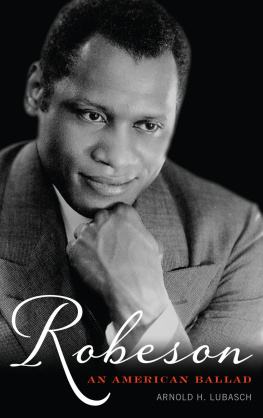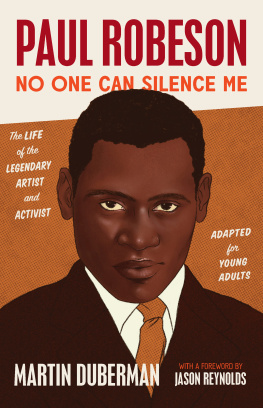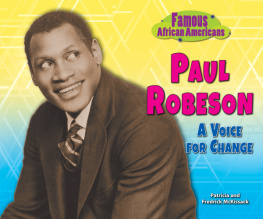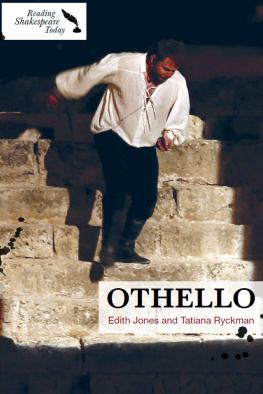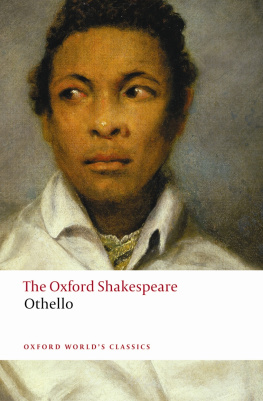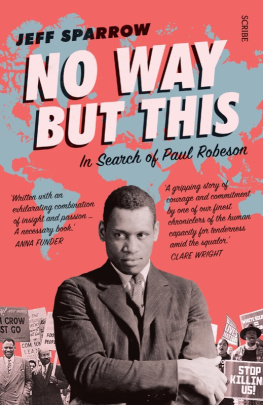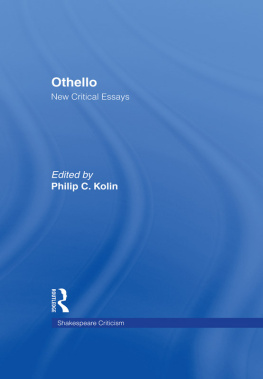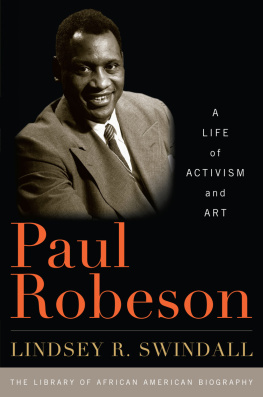Swindall - Politics of Paul Robesons Othello
Here you can read online Swindall - Politics of Paul Robesons Othello full text of the book (entire story) in english for free. Download pdf and epub, get meaning, cover and reviews about this ebook. year: 2011, publisher: University Press of Mississippi, genre: Detective and thriller. Description of the work, (preface) as well as reviews are available. Best literature library LitArk.com created for fans of good reading and offers a wide selection of genres:
Romance novel
Science fiction
Adventure
Detective
Science
History
Home and family
Prose
Art
Politics
Computer
Non-fiction
Religion
Business
Children
Humor
Choose a favorite category and find really read worthwhile books. Enjoy immersion in the world of imagination, feel the emotions of the characters or learn something new for yourself, make an fascinating discovery.

- Book:Politics of Paul Robesons Othello
- Author:
- Publisher:University Press of Mississippi
- Genre:
- Year:2011
- Rating:5 / 5
- Favourites:Add to favourites
- Your mark:
- 100
- 1
- 2
- 3
- 4
- 5
Politics of Paul Robesons Othello: summary, description and annotation
We offer to read an annotation, description, summary or preface (depends on what the author of the book "Politics of Paul Robesons Othello" wrote himself). If you haven't found the necessary information about the book — write in the comments, we will try to find it.
Politics of Paul Robesons Othello — read online for free the complete book (whole text) full work
Below is the text of the book, divided by pages. System saving the place of the last page read, allows you to conveniently read the book "Politics of Paul Robesons Othello" online for free, without having to search again every time where you left off. Put a bookmark, and you can go to the page where you finished reading at any time.
Font size:
Interval:
Bookmark:
The Politics of Paul Robesons Othello
The Politics of Paul Robesons Othello
OTHELLO
Lindsey R. Swindall

Margaret Walker Alexander Series
in African American Studies
www.upress.state.ms.us
The University Press of Mississippi is a member of
the Association of American University Presses.
Copyright 2011 by University Press of Mississippi
All rights reserved
Manufactured in the United States of America
First printing 2011
Library of Congress Cataloging-in-Publication Data
Swindall, Lindsey R., 1977
The politics of Paul Robesons Othello / Lindsey R.
Swindall.
p. cm. (Margaret Walker Alexander Series in
African American Studies)
Includes bibliographical references and index.
ISBN 978-1-60473-824-7 (cloth : alk. paper)
ISBN 978-1-60473-825-4 (ebook) 1. Robeson, Paul,
18981976Political and social views. 2. African
AmericansBiography. 3. Shakespeare, William, 15641616.
Othello. 4. Shakespeare, William, 15641616Stage
history. 5. Othello (Fictitious character) 6. Acting
Political aspects. 7. African American actors. 8. Theater
Political aspects. I. Title.
E185.97.R63S95 2010
782.0092dc22
[B] 2010022783
British Library Cataloging-in-Publication Data available
CHAPTER ONE
An Introduction to Shakespeares Othello
CHAPTER TWO
Robesons Professional Debut as Othello
CHAPTER THREE
A Burgeoning Political Consciousness: Robeson in the 1930s
CHAPTER FOUR
Robesons Othello on Broadway
CHAPTER FIVE
I Give of My Talents to the People: Robesons Politics in the 1940s
CHAPTER SIX
Robeson, Othello, and the Politics of the Cold War
CHAPTER SEVEN
Robeson at Stratford
First, I must offer thanks to those supporters who have witnessed this project take shape since its inception: John H. Bracey, Jr., Ernest Allen, Jr., James Smethurst, and Harley Erdman. I hope I have made them proud. Thanks also to Robert Paul Wolff, former director of the Graduate Program in Afro-American Studies at the University of Massachusetts, Amherst, who is always available to answer questions large or small. I am grateful to Arthur Kinney, Carl Nightingale, and Aldon Neilson, who offered input on my work at various stages. I would like to acknowledge the Gilder Lehrman Institute of American History for their research grant which enabled me to delve into several collections in New York City as I began this project. Thanks also to Randall Burkett and the helpful staff in the Special Collections at Emory Universitys Woodruff Library who awarded me a grant to pursue research in their valuable collections. I appreciated the assistance I received from Joellen Elbashir at the Moorland-Spingarn Research Center at Howard University. Many thanks need to go to the librarians at the Shakespeare Centre in Stratford-upon-Avon who were very prompt in sending materials from the U.K. Im also appreciative to staff at the Interlibrary Loan office in the W. E. B. Du Bois Library at the University of Massachusetts, Amherst, and the Hamilton Library at Franklin College for ordering materials so efficiently.
I would like to thank my friends and colleagues at Franklin College in Franklin, Indiana, for their encouragement and support as I revised the book manuscript, especially Carolyn Owens, Ralph Guentzel, Simone Pilon, Johanna Moya-Fabregas, Richard Gawthrop, and Kristin Flora. I owe a sincere debt of gratitude to the colleague who read the manuscript for the University Press of Mississippi and offered many insightful critiques. The book is definitely stronger because of her input. Walter Biggins, my editor at University Press, has been extremely helpful through the process of publishing my first book. I would also like to thank Seetha Srinivasan, director emerita of the University Press of Mississippi, with whom I first discussed publishing this project. A special note of thanks is due to two teachers who prodded my writing in its very formative stages: Sandra Pell and Terry Blankenship. Many thanks to friends and family who have provided listening ears, helpful feedback, shoulders upon which to sigh, couches upon which to sleep, as well as much-needed happy hour breaks: Marshall and Lisa Swindall, Lizabeth Foster, H. Edward Foster, Seth Foster, Jennifer Jensen Wallach, Jessica Overstreet, James Buckwalter, David Austin, Katja Meinke, Margaret Burggren, Sarah C. Baron, Alicia and Robb Contreras, and David Ritter. Bright moments to W. S. Tkweme who quite presciently handed me a biography of Paul Robeson some years ago and suggested that I might find this mans life to be of interest.
On a final personal note, I feel, if but in a small way, connected to Paul Robesons legacy as Othello. As an undergraduate exchange student studying in Warwick, England, for the 19992000 school year, I went to just about every Shakespeare production I could afford in Stratford and London. One weekend, a friend and I saw Ray Fearons portrayal of the Moor of Venice with the Royal Shakespeare Company at the Barbican Theatre. Despite our seats being about as far from the action of the play as possible and the resonating snore of my companion, I was enraptured. Having studied the play in high school and college, I went into the production with a pretty solid idea of what to expect. Yet, the pathos of this revival left me dazed. I vividly recall leaning on the back of the empty seat in front of me trying unsuccessfully to conceal the stream of tears that could not be contained during the cathartic final act of the play. The weight of the tragedy had, for the first time, rendered me emotionally devastated. Afterward, with a tear-smudged face, I staggered to the tube station and felt privileged to have taken part in, what was for me, such a profound artistic encounter.
At that moment, I was clueless that I would spend several years of my life pondering this play, but the seed was sown inside of me as to the magic that can occur on the Shakespearean stage. When I was researching this project, I discovered that Ray Fearon was only the second actor of African descent to play Othello for the Royal Shakespeare Company since Paul Robeson had forty years earlier. Learning this was an epiphany for me since I had been so moved by Fearons performance. As Paul Robeson was the inheritor of Ira Aldridges foundational legacy, Fearon was an heir of Robeson. This narrative is all I have to offer as progeny to their gifted artistry. I do so humbly.
May 1944 was a tense month in the struggle against fascism. The Allied bombing of Germany continued unabated while clandestine operations for an invasion of France coalesced on the coast of England. As soldiers dutifully followed orders in the European theater of war, artists back in the United States waged a battle of their own. That month, the Entertainment Industry Emergency Committee sponsored a radio program in New York City which was broadcast over the Blue Network. For this half hour, African American tenants of apartments in Harlem and brownstones in Brooklyn could visualize the impact their brothers, sons, and nephews were having in the war effort. Listeners could also conceptualize the importance of conveying that antifascist spirit from the war front back to the home front as they heard artists like Teddy Wilson, Helen Hayes, and Canada Lee assert that the problem of racial discrimination, like the issue of Hitlers menacing empire building and Hirohitos blatant attack on Hawaii, is one which we must face and solve. Perhaps the best-known voice on that program was the unmistakable baritone of Paul Robeson. In a dramatic reading the narrator queried Robeson, And if the Negro pilots of the [Ninety-ninth] Squadron could send a greeting to Abe [Lincoln] what do you think theyd say ? To which Robeson responded, You set us marching toward freedom and were marching with the world. His reply highlighted the vital contribution of African American troops in the war effort. Robeson also pointed out that Hitler did not care much for this squadron because it upsets his race theories and it upsets a lot of Nazi planes, too.
Next pageFont size:
Interval:
Bookmark:
Similar books «Politics of Paul Robesons Othello»
Look at similar books to Politics of Paul Robesons Othello. We have selected literature similar in name and meaning in the hope of providing readers with more options to find new, interesting, not yet read works.
Discussion, reviews of the book Politics of Paul Robesons Othello and just readers' own opinions. Leave your comments, write what you think about the work, its meaning or the main characters. Specify what exactly you liked and what you didn't like, and why you think so.

